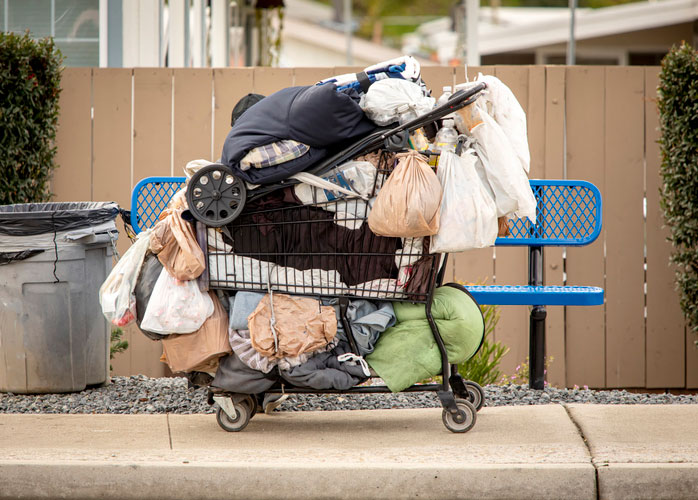Written by Helen Lewis
In Texas, social workers play a crucial role in addressing the complex challenges faced by the unhoused population.
In a Master’s of Social Work (MSW) program, you’ll learn a variety of skills that will be useful to deploy in the context of aid for people experiencing homelessness.
From cultural competence to awareness of intersectionality and human behavior, MSWs are well-positioned to be powerful support systems and advocates for people in need.


Homelessness in Texas
Over the last decade, the Texas government has made it a priority to dramatically reduce incidents of homelessness across the Lone Star State. Between 2010 and 2024, homelessness shrank by 28% in Texas, a statistic that’s now being used as an example to follow in California, which is experiencing skyrocketing rates of housing loss and instability.
Different cities across Texas have taken varied approaches to supporting the vulnerable communities living on the streets.
In Houston, permanent housing has been constructed to serve the unhoused community. San Antonio takes a different approach, providing a 1,600-bed emergency shelter. The abundance of beds is, according to one NPR report, sufficient to provide shelter for almost every person experiencing homelessness within the city’s borders. Meanwhile, Austin has constructed a “village” of tiny homes sprawling across 51 acres, which is currently home to a few hundred formerly unhoused people.
However, some activists are continuing to argue that the state’s response to homelessness is not only borne out of kindness. Since the state has outlawed “public camping,” housing activists argue that many unhoused people have been pushed out of the city and into rural areas, where they do not have access to social services like food, medical care, and reliable shelter.
Such activists are also dismayed by the city’s insufficient aid for homeless people during extreme weather events, like floods and scorching hot summer days. Though many of Texas’s largest cities offer “cooling centers” during the summer, where unhoused people can find respite from the summer heat, as of 2022, these facilities would close during the hottest part of the day, leaving the people they serve to go back onto the streets, often becoming dehydrated.
Social workers in Texas working with homeless communities could find meaningful employment on either side of this equation, connecting unhoused people with medical care at emergency shelters like the one in San Antonio or working as advocates, speaking up for homeless people who have found themselves effectively exiled from urban centers.
Texas-Based State Aid for the Homeless
The Texas Department of Health and Human Services provides a number of programs to support the unhoused community across the Lone Star State, such as:
- Permanent Supportive Housing Program
- Supported Housing Rental Assistance Program
- Section 811 Project Rental Assistance Program
- Projects for Assistance in Transition from Homelessness
- The Healthy Community Collaborative
- The Project Access Pilot Program
Texans who are struggling with housing insecurity and homelessness can also find support with the US Department of Housing and Urban Development (HUD). In addition to connecting Texans with SNAP benefits, legal assistance, employment, and housing counselors, HUD provides help hotlines and a resource locator to people in need.
In addition to working for state programs, social workers in Texas can also find work in collaboration with local non-profit organizations that support the homeless.
Social Work and the Homeless Population: Outreach
Outreach plays a pivotal role in the field of social work, particularly when addressing the needs of the homeless population. Master of Social Work (MSW) professionals engaged in outreach initiatives often work tirelessly to connect with individuals living on the streets, in encampments, or in other precarious situations. These outreach efforts aim to establish rapport, build trust, and understand the unique challenges faced by those experiencing homelessness. MSWs involved in outreach employ a person-centered approach, recognizing the dignity and autonomy of each individual, and work to link them with vital resources and support services.

MSWs in outreach roles are instrumental in conducting assessments to identify immediate needs, such as access to shelter, food, and healthcare. They act as liaisons between homeless individuals and available community resources, facilitating connections with emergency shelters, healthcare providers, mental health services, and substance abuse treatment programs. The outreach process involves not only addressing immediate crises but also developing long-term strategies to support individuals in transitioning out of homelessness. MSWs may collaborate with other professionals, including case managers, housing specialists, and community organizations, to ensure a comprehensive and coordinated approach to meeting the diverse needs of the homeless population.
Furthermore, MSWs engaged in homeless outreach contribute significantly to destigmatizing homelessness and advocating for systemic change. They work to raise awareness about the challenges faced by the homeless, participating in community education and advocacy campaigns to address root causes such as housing affordability, mental health services, and economic disparities. By actively engaging with the homeless population through outreach, MSWs bring attention to the humanity of those experiencing homelessness and work towards building a more compassionate and supportive society.
Social Work and Homelessness: Advocacy
One of the primary functions of MSWs in Texas is to conduct thorough assessments of homeless individuals to understand the unique circumstances that led to their housing crisis. By identifying the root causes, such as mental health issues, substance abuse, or economic hardship, social workers can tailor interventions to address these specific challenges. MSWs are adept at connecting homeless individuals with available resources, including emergency shelters, medical services, and food assistance programs. Additionally, they assist in navigating bureaucratic processes to access government assistance programs and work towards securing stable housing options.
Beyond immediate crisis intervention, MSWs in Texas engage in advocacy efforts to address systemic issues contributing to homelessness. They collaborate with policymakers to influence the development and implementation of social policies that promote affordable housing, mental health services, and employment opportunities. Through their tireless efforts, MSWs contribute not only to alleviating the immediate suffering of the homeless but also to creating long-term solutions that can break the cycle of homelessness and foster a more supportive and inclusive society.
Homelessness Prevention and Intervention in Social Work: Supportive Services
When it comes to the role of social workers in combating homelessness, supportive services are a key to addressing the multifaceted challenges associated housing insecurity. Master of Social Work (MSW) professionals often lead or contribute significantly to the development and implementation of supportive service programs aimed at assisting individuals and families in achieving stability and self-sufficiency. These services encompass a wide range of interventions, including mental health counseling, substance abuse treatment, job training, and assistance with accessing healthcare and housing resources. MSWs bring their expertise in assessing the unique needs of homeless individuals to tailor supportive services that promote holistic well-being.

One key aspect of supportive services for homelessness is the provision of mental health assistance. MSWs, often licensed clinical professionals, are adept at addressing the mental health issues prevalent among the homeless population. They offer counseling and therapeutic interventions to help individuals cope with trauma, stress, and mental health disorders that may contribute to their housing instability. Integrating mental health services into homeless support programs not only improves immediate well-being but also enhances the likelihood of individuals maintaining stable housing over the long term.
In addition to mental health services, MSWs play a vital role in connecting individuals experiencing homelessness with resources that address substance abuse issues. Supportive services often include substance abuse counseling, treatment programs, and harm reduction strategies. By addressing the root causes of addiction, MSWs contribute to breaking the cycle of homelessness associated with substance abuse, fostering a path toward recovery and stability. Overall, the comprehensive nature of supportive services, guided by the expertise of MSWs, is essential in providing a holistic approach to addressing the diverse and interconnected needs of the homeless population.
Fieldwork Opportunities
Fieldwork opportunities for Master of Social Work (MSW) students provide invaluable hands-on experience that can pave the way for a career in working with the homeless. Internships and field placements allow MSW students to apply their theoretical knowledge in real-world settings, gaining practical skills and understanding the complexities of addressing homelessness. Organizations such as homeless shelters, outreach programs, and community-based agencies often collaborate with MSW programs to offer fieldwork placements. During these placements, MSW students might engage in tasks such as conducting assessments, providing direct support to individuals experiencing homelessness, and collaborating with multidisciplinary teams to deliver comprehensive services.
Participating in fieldwork within diverse settings, such as mental health clinics, substance abuse treatment centers, or supportive housing programs, can provide MSW students with a well-rounded perspective on the interconnected issues faced by the homeless population. Fieldwork opportunities also enable students to develop crucial skills in case management, advocacy, and community engagement. By actively contributing to the efforts of organizations addressing homelessness, MSW students not only enhance their professional competencies but also build meaningful connections with the individuals they serve, fostering empathy and understanding that will prove invaluable in their future work with the homeless.
Types of Jobs MSWs Can Have Working with the Homeless
How can a social worker in Texas help a homeless person?
In Texas, individuals passionate about making a difference in the lives of the homeless can pursue various rewarding careers within the social services sector. Some of these job descriptions can include:
- Case Manager: Case managers work closely with homeless individuals, conducting assessments, developing personalized plans, and connecting them with essential services such as housing, healthcare, and employment opportunities.
- Outreach Coordinator: Outreach coordinators actively engage with the homeless population, identifying their needs and connecting them to available resources. They often collaborate with shelters, local agencies, and community organizations to ensure effective outreach efforts.
- Social Worker: Licensed clinical social workers (LCSWs) or MSWs can provide therapeutic support to homeless individuals, addressing mental health issues, substance abuse, and facilitating access to counseling services.
- Housing Specialist: Housing specialists focus on securing stable housing for the homeless, negotiating with landlords, and coordinating supportive services to ensure individuals can maintain their housing stability.
- Employment Counselor: Professionals in this role assist homeless individuals in acquiring job skills, preparing for interviews, and connecting with employment opportunities, ultimately empowering them to achieve financial independence.
- Advocacy Coordinator: Advocacy coordinators work on a systemic level, advocating for policy changes that address the root causes of homelessness and improve access to affordable housing, mental health services, and other critical resources.
- Substance Abuse Counselor: Specializing in addiction treatment, substance abuse counselors provide support and counseling to homeless individuals struggling with substance use disorders, helping them on the path to recovery.
- Shelter Manager: Individuals in this role oversee the operations of homeless shelters, ensuring a safe and supportive environment, managing resources, and coordinating services for residents.
- Educational Coordinator: Educational coordinators develop and implement programs to address the unique educational needs of homeless children and youth, facilitating access to schooling and supporting academic success.
- Community Organizer: Community organizers mobilize local communities to address homelessness, raising awareness, fostering partnerships, and advocating for solutions at the grassroots level.
Do I Need an MSW to Work with the Homeless?
While an MSW is often beneficial and can open up various opportunities for individuals working with the homeless, it is not always a strict requirement. Many positions within the field of homelessness assistance accept candidates with diverse educational backgrounds and experiences. The specific qualifications for such roles can vary depending on the nature of the job and the policies of the hiring organization. Some positions, like Case Managers, Outreach Coordinators, and Social Workers, frequently seek candidates with an MSW due to the comprehensive training in counseling, advocacy, and intervention that the degree provides.
However, it’s essential to recognize that other roles within the homelessness sector, such as Shelter Manager, Employment Counselor, or Community Organizer, may not necessarily demand an MSW. Individuals with backgrounds in related fields like sociology, psychology, counseling, or public health may find entry points into these positions based on their skills, experience, and a genuine commitment to addressing homelessness. Practical experience, demonstrated empathy, and a strong understanding of the complex issues surrounding homelessness can sometimes be equally valued by employers, alongside formal education. Ultimately, while an MSW can enhance one’s qualifications and effectiveness in assisting the homeless, passion, dedication, and relevant experience can also play significant roles in securing employment in this field.
Intersectionality and Homelessness
Intersectionality is a theoretical framework that acknowledges the interconnected nature of social categories, such as race, gender, class, and other identities, and recognizes how these intersections can compound and shape an individual’s experiences of privilege or oppression. In the context of homelessness, intersectionality becomes particularly relevant as it sheds light on the diverse and layered challenges faced by different subgroups within the homeless population. Understanding homelessness through an intersectional lens involves recognizing that individuals may experience homelessness due to a combination of factors, and their experiences are shaped by the intersections of various social identities.
For instance, a woman of color may face unique challenges and barriers compared to a white man in accessing resources and support while experiencing homelessness. Intersectionality in the context of homelessness extends beyond just individual identities to consider systemic factors such as discriminatory policies, economic inequality, and institutional barriers that disproportionately affect marginalized groups. Master of Social Work (MSW) professionals, with their training in addressing the complex interplay of social issues, play a crucial role in developing inclusive and responsive interventions that acknowledge the intersectionality of homelessness.
MSWs working within the framework of intersectionality in the field of homelessness strive to provide culturally competent and sensitive services that address the unique needs of diverse individuals and communities. This involves recognizing the varying systemic challenges faced by different groups, such as LGBTQ+ individuals, veterans, or those with disabilities, and tailoring interventions accordingly. By integrating an intersectional perspective into their practice, MSWs contribute to fostering more equitable and inclusive solutions for addressing homelessness, recognizing the importance of acknowledging and addressing the intersections of privilege and disadvantage that individuals bring to their experiences of homelessness.
Transitioning Out of Homelessness
Master of Social Work (MSW) professionals play a crucial role in helping homeless individuals transition out of homelessness. Through their training, MSWs are equipped with a comprehensive understanding of the complex factors contributing to homelessness, such as mental health issues, substance abuse, poverty, and systemic barriers. MSWs often engage in direct practice, working with homeless individuals on a one-on-one basis to assess their unique needs, develop personalized plans, and connect them with essential resources and support services.
MSWs employ a strengths-based approach, focusing on the inherent resilience and capabilities of individuals experiencing homelessness. They work towards building a therapeutic relationship with their clients, addressing immediate needs such as securing shelter, accessing healthcare, and obtaining necessary identification documents. Moreover, MSWs play a pivotal role in addressing the root causes of homelessness by providing counseling, advocacy, and assistance in navigating systems to access education, job training, and employment opportunities. By offering a holistic and client-centered approach, MSWs contribute significantly to empowering homeless individuals to regain stability, independence, and a sense of belonging within their communities.





